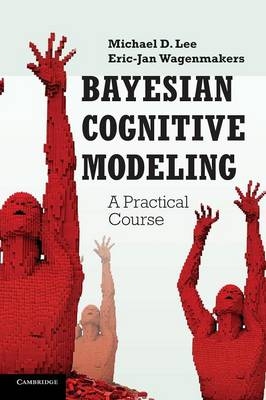
Bayesian Cognitive Modeling
Cambridge University Press (Verlag)
978-1-107-01845-7 (ISBN)
Bayesian inference has become a standard method of analysis in many fields of science. Students and researchers in experimental psychology and cognitive science, however, have failed to take full advantage of the new and exciting possibilities that the Bayesian approach affords. Ideal for teaching and self study, this book demonstrates how to do Bayesian modeling. Short, to-the-point chapters offer examples, exercises, and computer code (using WinBUGS or JAGS, and supported by Matlab and R), with additional support available online. No advance knowledge of statistics is required and, from the very start, readers are encouraged to apply and adjust Bayesian analyses by themselves. The book contains a series of chapters on parameter estimation and model selection, followed by detailed case studies from cognitive science. After working through this book, readers should be able to build their own Bayesian models, apply the models to their own data, and draw their own conclusions.
Michael D. Lee is a professor in the Department of Cognitive Sciences at the University of California, Irvine. Eric-Jan Wagenmakers is a professor in the Department of Psychological Methods at the University of Amsterdam.
Part I. Getting Started: 1. The basics of Bayesian analysis; 2. Getting started with WinBUGS; Part II. Parameter Estimation: 3. Inferences with binomials; 4. Inferences with Gaussians; 5. Some examples of data analysis; 6. Latent mixture models; Part III. Model Selection: 7. Bayesian model comparison; 8. Comparing Gaussian means; 9. Comparing binomial rates; Part IV. Case Studies: 10. Memory retention; 11. Signal detection theory; 12. Psychophysical functions; 13. Extrasensory perception; 14. Multinomial processing trees; 15. The SIMPLE model of memory; 16. The BART model of risk taking; 17. The GCM model of categorization; 18. Heuristic decision-making; 19. Number concept development.
| Erscheint lt. Verlag | 3.4.2014 |
|---|---|
| Verlagsort | Cambridge |
| Sprache | englisch |
| Maße | 178 x 254 mm |
| Gewicht | 700 g |
| Themenwelt | Geisteswissenschaften ► Psychologie ► Allgemeine Psychologie |
| Geisteswissenschaften ► Psychologie ► Sozialpsychologie | |
| Geisteswissenschaften ► Psychologie ► Test in der Psychologie | |
| Geisteswissenschaften ► Psychologie ► Verhaltenstherapie | |
| Informatik ► Theorie / Studium ► Künstliche Intelligenz / Robotik | |
| Mathematik / Informatik ► Mathematik ► Angewandte Mathematik | |
| ISBN-10 | 1-107-01845-5 / 1107018455 |
| ISBN-13 | 978-1-107-01845-7 / 9781107018457 |
| Zustand | Neuware |
| Haben Sie eine Frage zum Produkt? |
aus dem Bereich


